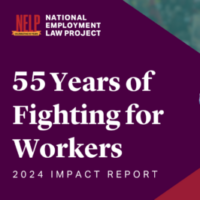
Equal employment opportunity as a fundamental right was a historic gain of the 20th-century movement for civil rights and human rights led by Black Southerners.
Yet, more than a half-century after passage of the Civil Rights Act of 1964, employment discrimination based on race remains a real obstacle to advancement in our nation. Racial (and other) discrimination and resulting disparities in job recruitment, interviews, hiring, and promotions remain significant in virtually all job categories and industries, but current data collection practices shroud discriminatory practices, particularly at the early stages of hiring. Bad data renders invisible the harm caused to Black, female, immigrant, and disabled applicants by disregarded applications poorly evaluated resumes, and overlooked promotions. This report addresses prevailing legal, policy, enforcement, and market flaws that currently obstruct fair employment practices. It argues for expanded governmental oversight and the use of selective audits designed to incentivize employers to eliminate bias in their hiring processes.
A large part of the problem is that under current practice workers have the burden of detecting and calling out racial discrimination that impacts them. Government agencies rarely intervene affirmatively to uncover and penalize inequitable hiring practices. But there is an underutilized tool—audit testing, also known as matched-pair testing—that can identify hiring discrimination, and potentially even target enforcement, more effectively. This paper argues that federal, state, and local agencies charged with combatting employment discrimination should be deploying this tool. Such audits, performed on a systematic basis, could be relatively easily and inexpensively administered in virtually every sector of U.S. economic activity. The need for more research, testing, and active government intervention to eliminate employment bias is real and long overdue.
The need for more research, testing, and active government intervention to eliminate employment bias is real and long overdue.
Download the full report to read more.
Related to
Related Resources
All resourcesShernice Mundell, Former Federal Employee

Worker Voices
2025 NELP Policy and Advocacy Agenda

Policy & Data Brief
2024 Impact Report: 55 Years of Fighting for Workers

Report


